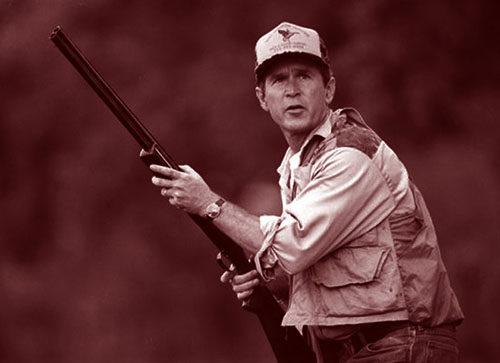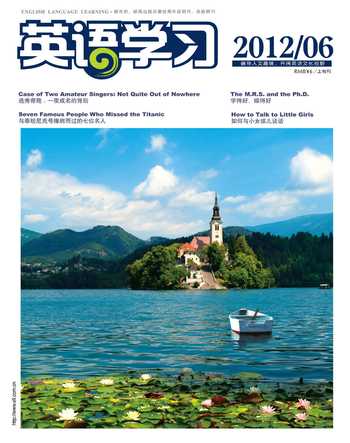美国总统爱打猎

Fewer than 6 percent of Americans are hunters. But we love to put them in the White House. Actually, Eisenhower, Johnson, Carter, Bushes father and son1—half the presidents of the last 50 years have been avid hunters.
Its more than the macho2 thing. All over the world, masculinity is a prerequisite for power, but few hunters are in residence in presidential palaces from Italy to France to Japan.3 Like cowboys, hunters are quintessentially4 American.
From the earliest days of the American colonies, democracy and hunting were intertwined5. Many settlers despised the British system, where all game was owned by the crown or private estates and only wealthy landowners could hunt.6 As early as 1623, Plymouth Colony decreed that fowling, fishing and hunting were “free” to all.7
In 1842, the U.S. Supreme Court decided the landmark New Jersey case of Martin v. Waddell, in which one side had claimed exclusive ownership of oysters from beds adjacent to his land along the Raritan River; the court ruled that “dominion and property” in the nations lands and waters belonged to the people.8
The ruling fit the country. America was a vast frontier, teeming with wildlife on uncharted lands.9 Generation after generation set out to tame the wild territory, facing tremendous hardship for the limitless opportunities that beckoned.10
Our heroes were hunters, pioneers and Indian fighters. Daniel Boone11. Davy Crockett12. Teddy Roosevelt, by far the biggest hunter ever to occupy the White House, was also a prolific writer who envisioned successions of great hunters and political leaders taking the nation to world power.13 Americans were unique among“civilized” nations, shaped by rugged14 individualism and the violence and possibility of the frontier.
More than a century after the census declared the American frontier closed, the ethos lives on through popular culture—movie westerns, television, political imagery.15 Presidents chop wood on the ranch and talk of projecting American power to the other side of world.16 It helps if they can knock down17 a few birds.
Few other nations were formed through the violent subjugation18 of the frontier, and few other nations view hunters—or guns—as we do.
In Germany, for example, hunters are respected as stewards19 of the communitys land. They are responsible for wildlife management in the way that fish and game officers are here. The most highly trained among them—more than two years of study and apprenticeship on top of the six to nine months of classes followed by written, oral, practical and shooting proficiency tests required for a hunting license—are honored as jagermeister.20
Only a jagermeister, or “master hunter,” has the stature to lease a communitys aggregated lands,21 bringing in other hunters to help care for the private resource in exchange for the right to hunt. Presenting oneself as a swaggering big-game hunter would be a good way to lose the privilege entirely.22
In America, its a good way to win the White House.
More is at play here than our fascination with frontier culture.23 We also like big-T personalities.
Big-Ts, a.k.a. T-Types, are at one end of a continuum of human behavior on which psychologists assess the importance of risk or excitement as a motivating factor.24 The “T” stands for “thrills” (as opposed to aggression, which is Type-A). Big-Ts are risk-takers; little-ts are risk-averse.25 Big-Ts are action-oriented types, either mentally or physically. They like intensity, independence and conflict; they dislike structure and control.
Virtually all American presidents are on the big-T end of the scale26. So are many hunters (and, for that matter, animal-rights activists). The writers of the Declaration of Independence were big-Ts, as were the pioneers and many among the waves of immigrants who left behind everything they knew in a bold move for a better life.
These are the observations of Frank Farley27, a Temple University psychologist who named the personality type 20 years ago and believes it is responsible for Americas domination of science, technology and popular culture, not to mention world power.
“We are a big-T nation,” he said.
A key attribute of a big-T is the ability to stand firm, even to thrive, amid uncertainty. Imagine a hunter faced with a charging grizzly28—or a president responding to a terrorist attack.
In times of national economic downturn, voters have a gut-level attraction to the biggest of the big-Ts.29 They are our frontier heroes, able to shoot the bear between the eyes and destroy the enemy we dont understand.


1. 本句提到的总统依次为艾森豪威尔、安德鲁·约翰逊、吉米·卡特和布什父子。
2. macho: 男子的,男子气概的。
3. 纵观全球,(具备)男子气概确为(获得)权力的先决条件,但从意大利到法国再到日本,总统府邸里身处任期的人(指总统)鲜有是猎手的。
4. quintessentially: 典型地,典范地。
5. intertwine: 交织,缠绕。
6. 许多移民鄙视英国的制度——在英国,所有的猎物都归王室或私人庄园所有,只有富有的地主才可以打猎。
7. Plymouth Colony: 普利茅斯殖民地,位于马塞诸塞州;decree: 命令,颁布……为法令;fowling: 打鸟,捕鸟。
8. 1842年,美国最高法院判决了新泽西州里程碑式的马丁诉韦德尔案,该案中的一方宣称对其拉里坦河沿岸土地附近河床中的牡蛎享有私有权;而法院裁决,国家的土地和水域的“统治权和所有权”属于全体人民。
9. teem with: 充斥着;uncharted: 图上未注明的。
10. tremendous: 极大的,巨大的;beckon: 召唤。
11. Daniel Boone: 丹尼尔·布恩(1734—1820),肯塔基州垦荒先驱,也是美国历史上最著名的拓荒者之一。
12. Davy Crockett: 大卫·克罗克特(1786—1836),美国拓荒传奇英雄及国会议员。
13. prolific: 多产的,作品很多的;envision:想象,展望。
14. rugged: 粗犷的,坚毅的。
15. census: 人口普查;ethos: 性格,特质;imagery: 形象化的描述,意象。
16. chop: 砍,伐;ranch: 农场。
17. knock down: 击倒。
18. subjugation: 征服。
19. steward: 管事,管理员。
20. 他们中受训程度最高的人——除六到九个月的课程以外的两年以上的学习和见习期,之后要参加获取狩猎许可证所必需的笔试、口试、以及实践和射击熟练度的测试——被尊称为“狩猎大师”。
21. stature: 高度水平,高度境界;lease: 租借;aggregated: 聚集的。
22. swaggering: 大摇大摆的;big-game:大型猎物。
23. at play: 起作用的;fascination: 迷恋。
24. a.k.a.: also known as, 又名,也叫作;continuum:连续性,统一体;assess: 评估。
25. big型人是危险的接受者,而little型人是危险的排斥者。
26. scale: 天平。
27. Frank Farley: 弗兰克·法利,美国坦普尔大学(Temple University)的心理学家,上述人格概念的提出者。
28. charge: 猛攻;grizzly: 北美洲灰熊。
29. 在全国经济萧条时期,选民们会本能地受到big型人中最强大的人的吸引。

